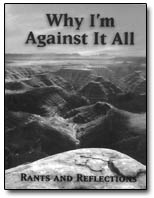| written by Amy Maestas
Book Review: Why I'm Against it All: Rants and Reflections
by Ken Wright; Raven's Eye Press, 178 pages

Perhaps the most challenging task to hand a book reviewer
is to have her read a book about her native West, written
by a transplanted Easterner. The stakes are high when
a guy from New England plops himself down in the rugged
Western terrain and begins ranting about its wildness,
the need to preserve it and laments about what’s
been lost in the last two or three decades. His stories,
to me, are familiar.
But that challenge isn’t so difficult, because
in his latest collection of essays, Why I’m Against
it All: Rants and Reflections, Durango author Ken Wright
offers plenty of wry yet unique perspectives about his
love for the West. Indeed, Wright often appears more passionate
about saving the West than even most native Westerners.
In his essays, he shows readers just how serious his love
affair is with this side of the country. Doing so, he
is dramatic, sappy, funny and sad.
 These
essays – some of which readers will have already
been treated to in other publications – showcase
Wright’s talent for weaving a good tale with inventive
sentences and lucid details. He writes about a range of
subjects, from his early days in the West as a ski bum
to the difficulties of fatherhood and responsibility,
intertwining it all with nature. These
essays – some of which readers will have already
been treated to in other publications – showcase
Wright’s talent for weaving a good tale with inventive
sentences and lucid details. He writes about a range of
subjects, from his early days in the West as a ski bum
to the difficulties of fatherhood and responsibility,
intertwining it all with nature.
The fact that Wright hails from the Northeast is an important
element in his essays. It shows how the grandeur of the
West’s vast landscape takes hold of outsiders, trapping
them in its maw forever – even if they don’t
make this place their permanent home. For those of us
who grew up in this territory, it reminds us of how awesome
it is. It whips us out of our take-it-for-granted attitudes
and restores in us a sense of appreciation.
For that, readers from the West can thank Wright. Readers
from elsewhere can thank him for introducing them to a
landscape that, as Wright so often discusses, is vanishing
at breakneck speed. This is the underlying message of
all of Wright’s musings, even if he sometimes doesn’t
make it so obvious.
His essays tend to be more about his experiences, with
sometimes only a tinge of politics or philosophy thrown
in at the end, as if to say that the essay has to serve
some purpose. This weakens Wright’s ability to throw
salt in the proverbial wounds of growth and development.
It’s a surprising twist, since many familiar with
Wright know that his hero is the former loud-mouth, irreverent
desert environmentalist Edward Abbey. In those places
where he does let loose his political rants, Wright sometimes
comes across as a bit hypocritical. In one essay he tells
readers to enjoy life – to “go with it”
but not to whine. Yet in the same breath he’s whining
himself about taxpayer-funded road improvements that will
allow more people – like him – to visit the
West, perhaps even stay here – like him.
Ultimately, this makes Wright’s essays sometimes
uneven in their scope. But don’t hold this against
him. Like everyone else clamoring to save the vestiges
of the Old West, Wright finds himself conflicted in a
world where evolution is paramount to survival. So, really,
Wright isn’t against it all. He’s just against
those ill-conceived ideas and poor decisions that threaten
what he’s for.
There are numerous examples in this book of what Wright
is for. Though he’s sometimes trite in his exaltations
of what the West should really be about, and he sometimes
tries too hard to separate himself from all the rest of
the newcomers, Wright’s stories about and perspective
on the macrocosm are worthwhile. Readers will find them
enjoyable, whether it’s because they’ve shared
the same experiences or whether they learn something new.
But readers better hurry and soak them up. It sure seems
like Wright isn’t long for this civilized world.
His next collection of essays may be scrawled on dead
wood in the isolated backcountry Wright will call home.
|

